This post may contain affiliate links.
As an ex-teacher, homeschooling parent and a bargain hunter frugal mum, I thought it would be useful to put together a ‘how to’ guide for home education on a budget. Hopefully this will help those home educating in the UK to enjoy: discounted days out, freebies, cheap travel, resources and activities. As well as being a bit of a guide for new families starting out, on where to start with homeschooling.
As well as money-saving tips and tricks, I’ve also included useful learning support if you’re wondering how and what to teach your children. Plus a bit of general info at the end of the article about how to go about deregistering children from school and the pros / cons of home education – just in case you need some help deciding if it’s right for your family.
So, if you’re keen to get started, or are already home educating and want to find out how to make the most of it without spending a fortune, this is definitely the article for you!
Is home education expensive?
If you’re thinking about home educating your children, you might be wondering whether it’s expensive, and who funds home education. Unfortunately, the short answer is you – parents are entirely responsible for funding homeschooling in the UK, so that’s definitely something to consider if that’s the route you choose to go down. It’s a shame, given how much funding schools are given per child, but there’s no help in the UK for home educating families at all.
Whilst it’s unlikely that you’ll be able to homeschool for free – fortunately home education doesn’t have to be expensive. Most families pay out for clubs and days out anyway, whether your children are in school or not, so it’s not really too different. Plus so much on offer for home educating families is discounted or reduced which really helps! It is definitely possible to home educate on a small budget – we certainly do – it can cost as much or as little as you like.
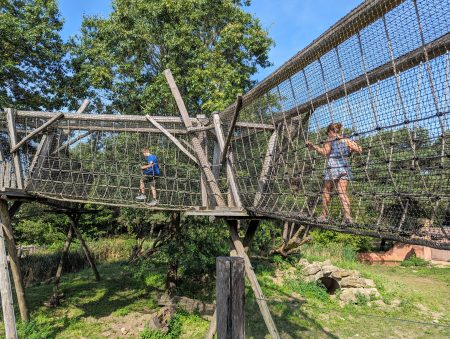
How to home educate on a budget:
We’ve been so fortunate to have had loads of fantastic experiences since we became home-edders. It’s totally doable to home educate cheaply in the UK – if you make the most of discounts and freebies you can enjoy cheap travel, learning resources, activities and days out!
There are so many places that offer reduced (or free) entrance tickets, and term-time travel is much more affordable, allowing us to do far more than we’d otherwise be able to. Plus, there are loads of free or cheap online resources to support your children’s learning at home too.
It’s not always easy to find the discounts, but here are some that we’ve come across! Share them far and wide so other home educating families can benefit too. (And, do let me know of any others that you discover!) So here are my top tips, hacks and discounts to help you to home educate (and have lots of fun with the kids!) on a small budget:
1. Make the most of home educator discounts for days out:
There are lots of discounted (or free!) UK days out available to home educating families. Lots of places offer school trip rates, and some will even let you visit for free. Just be aware that most of the time these things will need to be pre-booked and organised in advance. Here are some that we’ve made the most of:
Free English Heritage visits for home educators
English Heritage allow free term-time entry to their sites for home educating families, just as they do for school visits. If you’re home educating, you can email them to start an account which you’re then able to book educational visits through – just be sure to give a few weeks notice as they’ll need time to approve the visit and send you an entry permit.
We’ve used this perk to visit both local attractions and English Heritage sites when we’re on UK holidays. This means that you can visit some fabulous places like these without spending a penny!
Dover Castle
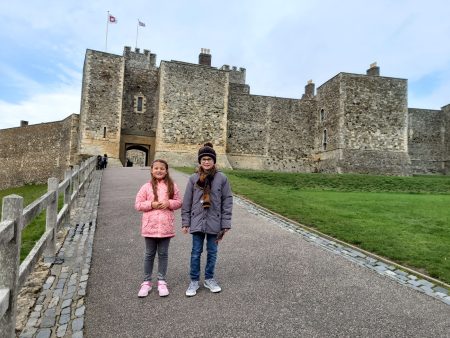
Walmer Castle

Reduced or free museum entry
Loads of museums offer free entry (and those that don’t will often let home-edders in for free or under school rates). But, there are also extra benefits to be had. For instance, if you contact them to pre-book, The Science Museum in London offer their Wonderlab experience for a couple of quid instead of the usual entry price.
And, at lots of museums, you’ll also be able to access days specifically for home-edders or attend free or reduced workshops. Always contact the place that you want to visit, or explore their website, to see what’s on offer. It means you’ll need to do a bit of extra planning but it can be really cost effective.
Discounts on big attractions
There are tons of well-known attractions (like theme parks, zoos and castles) that offer reduced / school rates for home educating families. They are rarely well advertised, and usually need to be booked in advance, so doing some investigating before you go is definitely a must.
Sometimes the info will be hidden on their websites, but if not it’s worth emailing to find out what they offer. Some places will require a certain number of children, so it can also be worth organising a home-ed outing with other families too.
Here are a few examples that we’ve come across – showing just how much can be saved if you investigate!
The Eden Project – we visited for just £5.60 per person!
ZSL London Zoo – our family of four paid around £40 for entrance.
Other popular attractions which currently offer discounted rates for home educators are places like Legoland, Chessington World of Adventures and Thorpe Park – in fact, most of the big theme parks offer school rates to make those expensive days out more affordable.
For places that don’t offer specific home-ed discounts (though it’s always worth asking!), some will offer reduced rates for off-peak entrance so going during the week can be beneficial – and it’ll be less busy too! This works for things like theatre tickets as well, as you’ll be able to go at less popular times.
Train travel for a quid
If you’re in the South East, kids can travel off-peak on the train for just a quid – making getting away, or having days out, so much more affordable. For all of the info you need on how to benefit from this deal, check out my post on Southeastern Rail. Not travelling in the South East? Take a look at the area you’re visiting to see if they have any deals on offer.
National Trust home education card
The National Trust offers a reduced yearly family membership to home educators for around £50 – so you can easily get your money back by visiting just a few places. And, it’s really handy to have for free days out during UK staycations. There are some fabulous places available – my favourite is definitely St Michael’s Mount in Cornwall.
Blue Peter Badges for free entry
Not just for home-edders, but a Blue Peter Badge is definitely worth having! If you’re exploring the UK on a budget; children can gain free entry to over 200 Blue Peter Badge attractions around the country such as theme parks, zoos and castles – making days out a lot more affordable. There are lots of ways to earn a badge, check out my article on Blue Peter Badges for more info.
Freebies in the capital
Surprisingly, cities can often be really affordable places for holidays and days out. In particular, there are loads of FREE things to do in London with children – even if you’re not a fan of the museums. From to playgrounds, to lidos, to farms and zoos – there’s something to entertain everyone. Make sure you read my post on free days out with the kids in London for more info. This is not just for home-edders, but exploring during term-time will be far less busy!
Discounted days out and holidays with Kids Pass
Kids Pass is a fantastic way to save on the cost of days out and family holidays! In 2021, through Kids Pass, we saved £30 on a Haven holiday, and £20 off our Butlins break – the easiest £50 saving ever! When you combine the discounts with already low term-time / off-peak prices, you can do loads on a small budget.
The best bit is that you can trial it for 30 days for just a quid, and cancel membership if you don’t want to continue. Though, if you have frequent days out, it can be worth the couple of quid per month subscription cost.
2. Enjoy cheap term-time holidays:
Our favourite thing about home educating is how often we’re able to travel. With no ties to school or work (we’re both self-employed) we can come and go as we please, and with it being so much cheaper to travel term-time, we’re able to go much more often and for longer periods of time. There are some fantastic term-time deals – these are our favourites!
Eurocamp
We adore road-tripping, and Eurocamp can be super cheap when you avoid the school holidays. A few years ago we organised 3 weeks of accommodation around Italy for around £650 – we had the best time ever! You can easily book a week away for £300 or less, and they offer discounted ferry and Channel Crossing travel too.

May / June and September can be great times to travel on a small budget, avoiding peak holiday times but still benefitting from good weather. Going during these times also means that the sites are less busy, particularly in September, so it can make for a better holiday experience too. So much learning can be done from exploring our wonderful world, so cheap travel is definitely a huge benefit of home educating.
Take a look at my Eurocamp category for lots of travel ideas and campsite reviews!
And, to make the most of Eurocamp’s discounts – you’ll want to check out my Eurocamp guide – it’ll tell you everything that you need to know about Eurocamp holidays and how to save money on your getaway too!
Butlins
Butlins holidays are another amazing perk of home-edding! There are extremely cheap term-time Mon-Fri deals. Last year we went for £88 – and we’ve got friends who’ve booked for about £60 this year! With so much included when you get there, it can be ridiculously good value for money and the kids absolutely adore it. For more info, check out my article: Are Butlins holidays good? Butlins Bognor Regis vs Minehead Review – and money saving tips!
Sun Newspaper Holidays
The Sun Newspaper holidays are fab for us home-edders as there’s a lot more availability for term-time dates. We booked two in 2022 – one Norfolk break which was £66 for Mon-Fri in May (including a caravan upgrade) and another for £78 to the Isle of Wight in June. Both resorts were Parkdean and it cost us a fraction of the price it would have to book directly. We had two holidays for less than the price of one!
For more info on Sun Newspaper Holidays check out my article: How do I book a £9.50 Sun Newspaper Holiday? Review: Are they worth it? (+ January 2024 codes!)
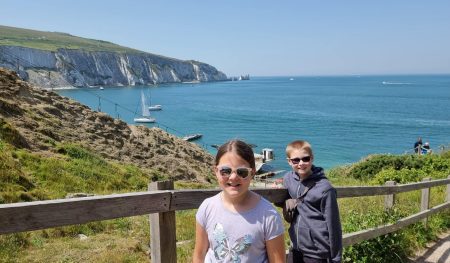
Haven Holidays
Haven holidays offer another brilliant cheap and cheerful UK holiday option; we stayed for 7 nights in Wales in September 2021, at Hafan y Mor Holiday Park – it was just £263 and we had such a great week. Haven Holidays offer fab savings if you avoid the peak school summer holiday period – this year they’ve offered breaks away from as little as £65 so it’s well worth a look.
TUI Holidays
TUI offer some excellent off-peak package holiday deals, and their offers can be combined too! For our trip to Spain last May, we took advantage of a free child place, AND a TUI offer of £100 off which was running at the time of the booking. The holiday worked out at about £250pp which included 7 nights in a 4 star hotel (The Villa Romana – click through to check out my review), breakfast and dinner each day, flights, coach transfers and luggage.
TUI have added a great calendar section to their bookings now as well – the green £ shows the cheapest date to travel for each month – you can flick between the months or just compare dates around when you were looking to travel. For more info, check out: TUI Holiday Review and Tips: Are TUI good? How can I save money on my TUI family holiday?
3. Use home educator discounts for lessons and clubs
One of the best things that we’ve found about home educating is how many clubs and lessons are available at reduced/school rates. The swimming lessons we attended for 2 years were around £20 each term for both children, since it was offered at the rate given to schools.
It’s always worth asking around to see what’s on offer but, if what you’re looking for doesn’t exist in your area, it’s worth contacting sports centres, museums, libraries and other venues etc to see what can be organised. Many will have little footfall during the day so there’s often a deal to be done – and they’ll always be other home educating families happy to join in!
One thing I will say though is to avoid over-committing to clubs – it’s really easily done when you first start out, we’re programmed to think that children should socialise every day like they do in school. But, take time to see what works for your family, and go for quality over quantity, following their interests. Not only will it save you money but you’ll avoid burnout too – home educating is a huge time commitment so be selective about how you schedule your week for everyone’s well-being.
4. Tutor wisely
I work as a private tutor for school and home educated children. Tutoring can be useful if you’re not sure where to start, or are perhaps trying to juggle working or looking after little ones as well. It’s often done through Zoom, so it can be done from the comfort of your own home, and even on your travels too! For some families it may just be an extra boost, for others I’ve taught all of the English and maths work for the children, set homework and provided reports – it really depends on what works for each family.
Joint tutoring groups or learning clubs can be a good way to reduce costs whilst getting some support for your child. It can also be worth looking at organising classes or groups yourself. It’s often parents who set up sports clubs, tutoring groups, forest schools, art lessons or science classes etc so if you feel that there’s something that others would also benefit from then ask around and see what you can create yourself.
The £2 Tuition Hub is brilliant for cheap classes that can be accessed from home, live or pre-recorded. You can easily dip in and out of the topics, and we will definitely make use of the IGCSE courses when we get to that stage, to help the kids to get through their exams in an affordable way.
5. Buy only the necessities
You might be thinking, what do I need to get started with our home education journey? And honestly, resources wise, you don’t need a huge amount of things. It’s best to figure it out as you go along, purchasing the necessities as you need them.
Obviously you’ll need the basics – workbooks / textbooks, pens and pencils, paper etc and some sort of access to a computer or tablet is handy too, as there are loads of great resources online. But think about how much use something will get before you invest in it – you could use these tips to save some money instead:
Get a home educator library card
To keep costs down make use of the library – a lot of books will be read once or used briefly to support a topic, so rent don’t buy. We see the library as a free treat, we can all stock up on our favourite books, as well as borrowing what we need for our learning, without spending a penny.
Libraries are great for renting things like cookbooks too – you can try some new recipes, and photocopy the ones that you like, without buying the book. We’re in Kent, but I’m sure the perks across the UK are similar – with our home educator library card we can:
- Rent loads of books at once – I think it’s about 30!
- Rent books for longer periods of time and renew them more times.
- Avoid fines.
- Reserve books to be ordered in from other libraries without any fees.
- Take out reference books that can’t usually be borrowed.
- Get an allocation of free time on the computers and some print-outs / photocopies too.
Share / borrow / rent resources
There are places to rent things that you might need, for example resources for Science or topic work. Some libraries offer this, and museums may be useful for that kind of thing too. There is also the option of borrowing from friends, or sharing the cost of resources with other home ed families – so you can split the cost of what you need between you.
Shop second-hand
For things that you do need to buy, always look to see what you can pick up second-hand before you buy new. You might be able to get textbooks and resources for next to nothing online, or purchase bits and bobs from homeschool families with older children as and when they move on to the next stage.
Particularly for younger children, who will need to be stimulated and learning through play for much of their day, second-hand shopping for toys, craft bits and outdoor toys will save you a fortune. You might even find some freebies!
6. Organise free fun
Socialising your children doesn’t have to cost a penny, nor revolve around structured clubs. There are so many home education groups on places like Facebook, so it’s easy to find like-minded families and see what’s happening on your doorstep.
Taking the children for nature walks, to play in country parks, or to meet up somewhere like the beach or a local farm is a great way for them to hang out with their friends, get you all out of the house and keep everyone occupied without spending a fortune.
Certainly, making the most of the outdoors is the way to save money, and the kids will need this play and exercise time to let off steam. Simple things like taking a bike ride when you fancy it or wandering the woods with the dog in the middle of the day are what make home educating brilliant – the freedom is wonderful.
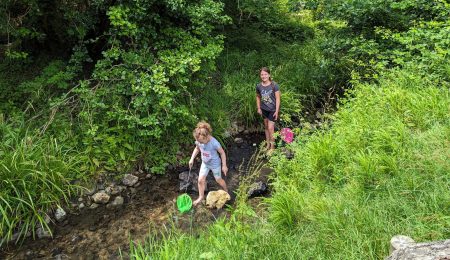
When you do go for days out, make sure that you pack a picnic, snacks and drinks too. You’ll be out and about entertaining the children during the week, rather than just the weekends, so all those extra bits could be really expensive if you’re not heading out of the door prepared.
It’s also useful to think about picking up friends on the way / car sharing to save on fuel costs and parking charges, if you’re headed in the same direction anyway. And, during the week we try to get around on foot or by bike as much as possible, to avoid using the car too much.
7. Save for exams
Whilst you will have to pay out for exams if you choose to have your children sit GCSES / IGCSES (I reckon it’ll cost around £1000 for my two when the time comes) you do have to factor in how much you’d have spent on school uniforms, secondary school bus passes, school trips, school resources etc over the years. (I know families who pay £300 per child for the bus each year!) And, when you think about it like that, it doesn’t seem so bad after all.
I think the best way to go about it is to save a little bit every month from the start of your homeschooling journey – that way the money will be ready and waiting when you need it, without you having to find it all in one go.
You also have the option of spreading out the exams over a longer period of time, to split the cost. And, to avoid it completely, lots of colleges offer 14-16 provision where exams can be taken – so you might also want to look at what’s on offer locally if college could be option for your child. Some courses are part-time, supplementing home learning, but others are full-time and more like a school provision. Local authorities all offer something slightly different, so see what’s on offer near you.
8. Structure your own home education curriculum
To home educate on a small budget, it definitely helps if you can structure your own curriculum, rather than buying into expensive schemes or relying heavily on classes or tutors. (Though they could be a good investment if you’re feeling unsure on what to teach your children.) As a qualified teacher and a home educating parent, I constantly get asked by other home-ed parents which textbooks are good, what level should their child be working at, or a general ‘Where do I start?’ for those at the beginning of their journey. Being responsible for your children’s learning can feel overwhelming at times.
There are tons of ways to home ed – some world school, some unschool, but lots (like us) do a mix of social and fun activities alongside some sort of formal learning. If your kids are planning to take GCSEs or go to college, keeping them on some sort of path is useful.
So, whilst there are lots of different routes (and by all means go with what works for your family) this is how I do it. We generally do our ‘proper learning’ from 10am-12pm each day – with our afternoons based on informal learning, skill building (such as gardening or cooking), clubs, exercise or social meets. The bits I’ve added below will look at the formal learning side if you’re not sure where to start. So, if you’re feeling a little lost, and trying to organise your curriculum on a budget, hopefully this will help…
English Curriculum Work
I like to teach English in a few different ways:
- Workbooks for explicit grammar, spelling and punctuation work.
- Book studies to reinforce the above within a context, while developing reading and writing skills.
- Reading for pleasure, alongside watching films and documentaries.
- Writing tasks – such as writing a letter, creating a non-chronological report or writing for a purpose such as to persuade. (This could be linked to topic work too – e.g: a diary entry for a WW2 evacuee.)
- Games such a scrabble to help with spelling for older ones, and other games or flashcards for the younger ones.
The CGP workbooks are fantastic – they can be bought to cover learning from reception level, right through to the end of secondary level. They have explanations and examples as well as questions to work through.
They’re about a fiver on Amazon and will cover a year’s worth of learning elements, in line with the National Curriculum. I find workbooks much easier than worksheets – no organisation (or missed areas of learning), you don’t waste hours printing things off, and with the cost of ink these usually work out cheaper.
I like to use the books above alongside their 10 minute workout books – this ensures that the areas of learning are being muddled up and constantly reinforced to keep things fresh. All of these books have the answers at the back too, making things super simple.
The Literacy Tree website is fantastic for English planning linked to the primary curriculum, based around different texts. Simply order the book you need from the library, and purchase the planning sequence (usually £5) to accompany it. The printable resources needed are also included, so it’s easy to follow. Whilst these are designed for teachers, rather than home educators, having these plans is a great way to give your child good quality teaching even if you’re not feeling like an expert!
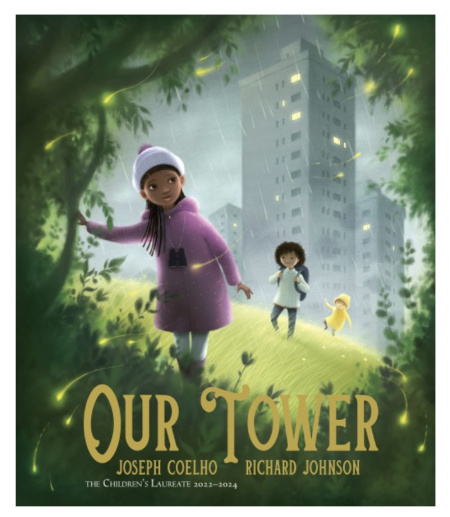
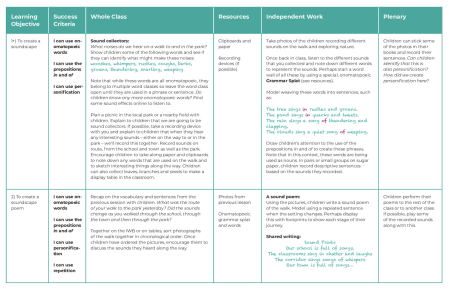
For more detail about the content that’ll be covered, and the terms they’ll need to learn, purchasing a study book which will cover a whole key stage (like the one below) might be a useful tool.
And, there are tons of brilliant (free!) videos on the BBC Bitesize website to help!
Maths Curriculum Work
Maths can largely be taught in a similar way:
- Study books and online videos can be helpful for introducing new subject areas if you’re not too confident about how to do so yourself.
- A good textbook will help the children to rehearse their new skills.
- Mixed maths workbooks are useful for reinforcing learning and keeping things fresh – as there’s so much content for the older ones!
- Link maths to real life where possible for context and interest, eg: playing shops to introduce money, weighing ingredients when cooking, looking for shapes around the house or talking about fractions when sharing out sweets for movie night.
- Play board games like Monopoly, online games, and learn using manipulatives like lego.
Again, a study book that covers the whole Key Stage will be a good investment, and websites like BBC Bitesize (or even you tube videos) can be useful for explaining different methods and ideas.
For Key Stage One children (up to age 7) it’s best to purchase workbooks that they can fill in to make things less complicated. Once they get beyond this, a decent textbook that will cover a year’s worth of curriculum work is a great place to start. I love the Target Your Maths books for primary level learning – each page is differentiated in three ways which is so helpful!
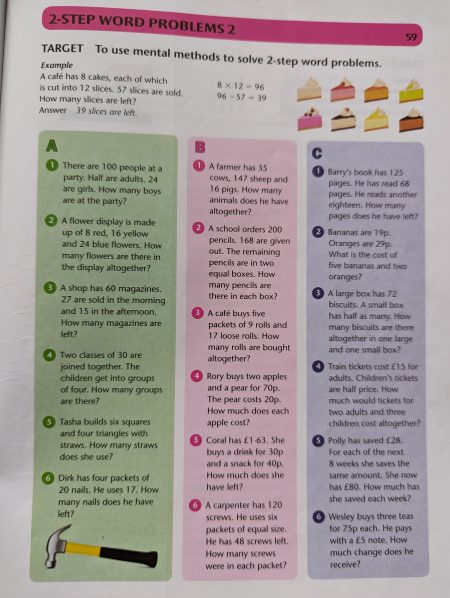
For Key Stage 3, we’ve headed back to CGP and will be follow their secondary textbooks, like the one below.
As with English, the CGP ten-minute maths books are brilliant for mixing up all of the different areas of learning to keep it fresh – these are great to run alongside the other textbooks.
Topic work
We do topic work to cover the science curriculum, and also loosely cover history and geography through this too – though we generally pick topics based on interest and curiosity rather than following set school based themes. For this, we like to use big A3 scrapbooks so that the children can be creative and record their learning in a less formal way.

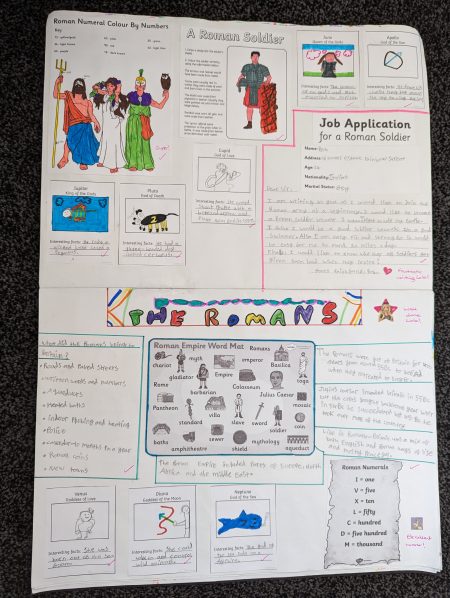
Most kids enjoy topic work so keeping it fun is a good way to go. You can also sneakily feed in English skills through other topics – just don’t tell the kids! 😉 We watch lots of documentaries (on the TV and you tube) for topic work, cover history and geography themes through travel and outings, read books, research online, do practical experiments, and enjoy activities like planting seeds.

Museums, castles, zoos, historical sites – most days out can develop learning of some form. Topic work is really easy to make hands on and interesting, so that a lot of the time they don’t even know that they’re learning!

If you’re looking to get them through Science exams further down the line then, again, the CGP resources are really useful. We’re using the KS3 workbook (supported by the KS3 study book) now that they’re older…
But for the primary curriculum, we relied on the KS2 study book to guide our areas of learning but kept things more hands-on, and recorded everything however they fancied in their scrap books.
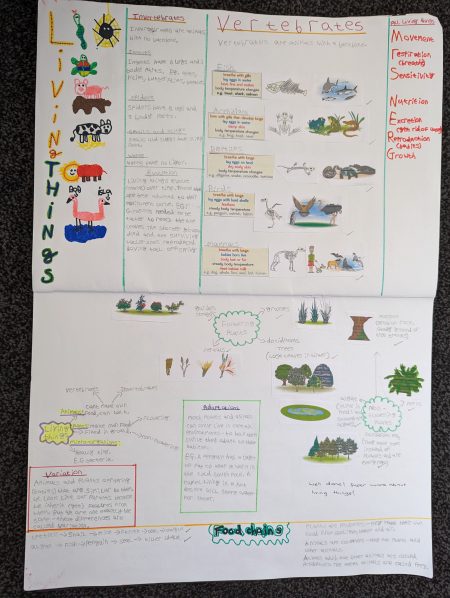
Don’t forget to enjoy music, sports, art and all of the other wonderful creative subjects too. And, don’t feel like you have to do it all alone. The home ed community in the UK is huge now, so make the most of everyone’s skills and talents.
Talented family members can help out with skill building as well. Finn does woodwork with my dad, and when Lola wanted to learn to sew I sent her to my nan. You won’t have all the answers, nor be able to teach them everything they’re interested in, but someone will! Keep costs down by sharing skills where you can, people are often happy to help.
9. Make the most of the TV
There are always lots of documentaries about the planet, animals, travel, healthy eating, the environment and other things on TV (channels like the BBC and channel 5 can be useful), Netflix and Disney+ – they even have a section for National Geographic.
My two love watching Ben Fogle as well, and that often opens up conversations about different places. They also loved Will Smith’s documentary series ( Welcome to Earth) and Zac Efron’s too (Down to Earth), and they love the Planet Earth series.
Making the most of what is already on the channels / streaming services available to you is a great way for the kids to learn without realising their learning, and it won’t cost any extra either.
10. Learn through ‘cheap and cheerful’ play
If your child is under the age of 6, the best thing that you can do is to develop their imagination and learn as many skills as possible informally through play. Young children are not designed to sit still for long (I’m not sure adults are either to be honest!) so interacting with the world and having lots of days out, mark-making with chalks on the patio, planting in the garden, helping to cook dinner and making lots of mess with paint, lego and play-dough really is the way forward with the little ones.
Once they’re ready for more, little and often is the best way to introduce formal learning. Physical resources are really useful for the little ones – things like: flashcards, role play areas, word games, pieces of paper for sentence building, lego pieces for counting and place value work, or a learning-clock to help them tell the time.
Even as they get older, my kids (now 10 and 12) still love lego, colouring, gardening, baking, playing on the beach or getting filthy in the woods! Play doesn’t have to stop, nor does it have to come in fancy expensive boxes, and with home education they have plenty of time to just be kids!

Check out the ‘games and activities‘ tab on my website for loads of free printables – from Halloween, to Christmas or Easter, I’ve got quizzes, printable bunting and craft activities, workbooks and all sorts of freebies to keep the kids busy!
11. Use cheap / free online home education resources
I thought it would be handy to compile a list of online games and resources to support home-ed families (or give homework help for those in school) to make life a little bit easier. There are loads of useful websites to find worksheets, video / powerpoint explanations of topics, games and resources. Here are my favourite free (or cheap!) websites to support children’s home learning…
A bit of everything
Primary Resources
http://www.primaryresources.co.uk/
There are lots of printable worksheets on here, organised into different subjects and with clear age ranges.
Oxford Owl for Home
https://www.oxfordowl.co.uk/for-home/
Lots of free resources for primary age children.
Twinkl
https://www.twinkl.co.uk
The holy grail of teaching resources and printables! Twinkl have some free resources, or you can sign up to a subscription with them to access a whole lot more. (Sign up to their facebook page to grab their Home Ed annual subscription discount.)
Ted Ed
https://ed.ted.com
Engaging educational videos about a wide range of different things!
BBC Bitesize
https://www.bbc.co.uk/bitesize
This website is a brilliant resource covering all age ranges and subjects – it’s a great place to start when introducing a new topic.
Crash Course Kids
https://m.youtube.com/user/crashcoursekids
Videos for kids – particularly useful for Science.
DK Find Out
https://www.dkfindout.com/uk/
This is a brilliant, child-friendly resource which allows children to research a wide range of topics – perfect for a project!
Primary Homework Help
http://www.primaryhomeworkhelp.co.uk/
This website has a bit of everything but I think it’s particularly useful for topic work.
The £2 Tuition Hub
https://the2poundtuitionhub.com/
Access online lessons from just £2 covering a wide range of subjects and areas of interest, for primary and secondary kids. (Plus IGCSE courses)
English
British Council
https://www.britishcouncil.org/school-resources/find
Resources for English language learning.
Fun English Games
http://www.funenglishgames.com/
Loads of English games, activities, quizzes and videos!
Maths
Topmarks
https://www.topmarks.co.uk/maths-games
Topmarks is not just for Maths but it’s really useful for Maths games, organised into age ranges and learning areas.
Maths Frame
https://mathsframe.co.uk/en/resources/category/22/most-popular
This website has lots of fun, free Maths games.
Science
Science Kids
http://www.sciencekids.co.nz/
Games, facts, experiments and videos – there are lots of bits here to keep a budding Scientist entertained!
Wow Science
https://wowscience.co.uk/
There are lots of free games, videos and hands-on activity ideas on this fab Science website.
Geography
National Geographic Kids
https://www.natgeokids.com/uk/
Activities and quizzes for younger kids.
Geography Games
https://world-geography-games.com/world.html
Lots of Geography games.
History
BBC History
https://www.bbc.co.uk/history/forkids/index.shtml
A great resource, filled with child-friendly History topics.
History for kids
https://www.historyforkids.net/
This website has a ton of free, child-friendly History resources.
Computing
Blockly
https://blockly.games
Learn computer programming skills – fun and free.
Scratch
https://scratch.mit.edu/explore/projects/games/
Creative computer programming – Scratch provides a child-friendly, game based introduction to coding.
Languages
Duolingo
https://www.duolingo.com
Learn languages for free. Web or app – my two love this, and have been learning Spanish for a while now.
Art & DT
Lego
https://www.lego.com/en-gb/life/magazine
Get a free Lego Life Magazine subscription for children between the ages of 5 and 10 – delivered to your door!
12. Utilise what you already have
As well as being such an important skill to teach, cooking is such a great way to engage children and can be used to promote learning across the curriculum too! And, the best bit is you’ll likely have everything you need to get started in your kitchen already.
Here’s how to make the most of a cooking lesson:
- Talk to your children about diet and nutrition.
- Discuss where the ingredients come from and how they grow.
- Allow children to use measuring scales and jugs to develop their maths skills.
- Talk about fractions when you’re measuring and cutting food.
- Explain the importance of chemical reactions in cooking – there are also lots of Science experiments that can be done using things from your kitchen too.
- Look at reversible and irreversible changes – once the cake is cooked you can’t get the ingredients back to their original state.
- Develop fine motor skills by allowing them to chop, stir and knead.
- Encourage reading by asking your child to read the recipe – what ingredients do you need and what should you do first?
- After cooking, ask children to create a restaurant menu for dinner time to encourage them to write. My two love used to love using the cash till at dinner time to charge us for our meal!
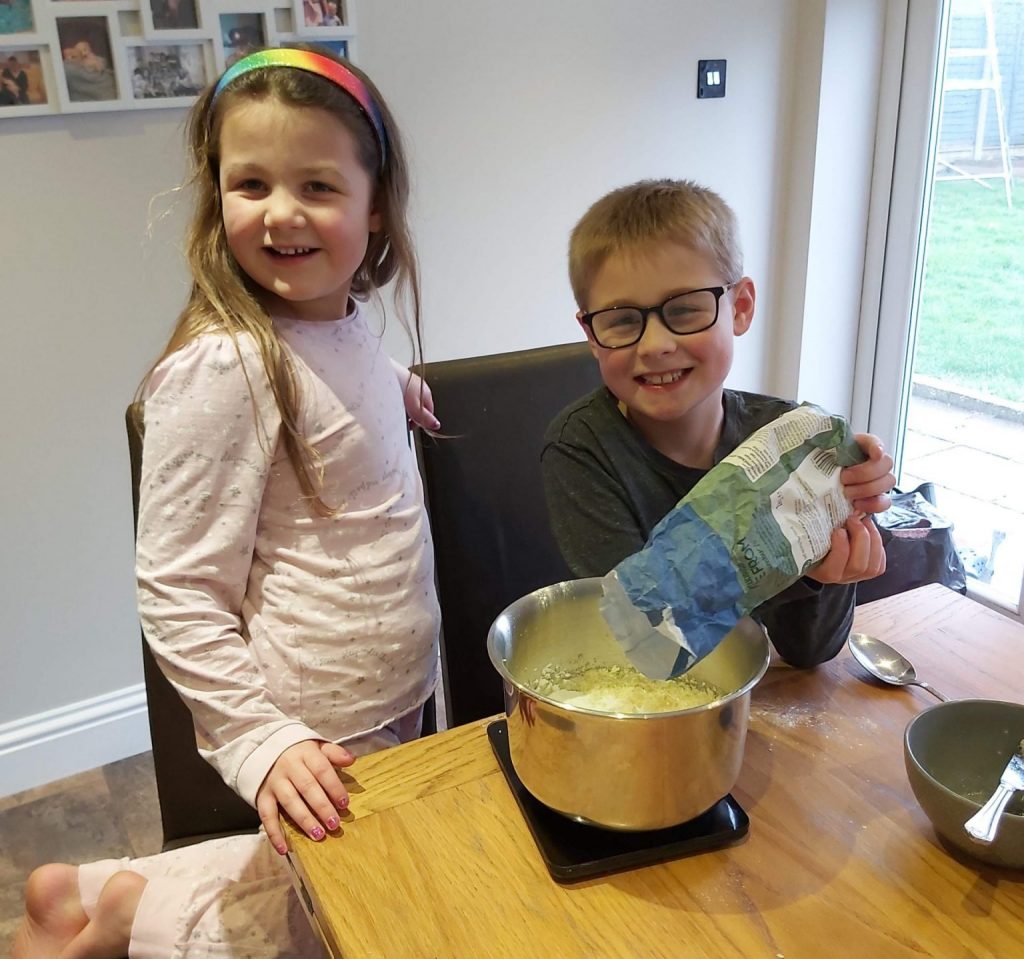
13. Make cutbacks in other areas
One tip I would definitely suggest, if you’re debating whether you can afford to home educate, is to look at other costs which can be reduced to accommodate it. The nature of home-edding means that one parent will likely work part-time or not at all in order to be with the children so, though home education can be done inexpensively, it can take a toll on your finances when you look at the time commitment involved.
To offset this, it may be that you need to save money in other areas, and we try to be as frugal as possible to make sure we can afford to travel and make the most of the freedom that comes with a homeschooling lifestyle.
For loads of tips for living in a more simple, frugal way – check out my article:
The Ultimate Family Frugal Living Guide: 25 simple tips to save you money!
And for more tips on saving money on travel, check out:
25 tips for travelling abroad on a budget with kids – here’s how to save money on your family summer holiday!
General home education guidance
How do I get started with home education in the UK?
Homeschooling is totally legal in the UK – if you’re not yet home educating, but feel it’s the right thing for your child, you are legally entitled to be able to remove your child from school to pursue a new way of living and learning.
If you’re wondering how to go about home educating in England, and the law surrounding it, you can deregister your child simply by writing a letter to their current school to inform them of your intentions. You don’t need their permission, nor do you have to give any sort of notice period.
You can choose to follow the UK curriculum in line with schools, work at your own pace or teach your own curriculum entirely. Your children can sit exams privately, look for alternative qualifications, or not sit any exams at all. There is a lot of freedom in home education, so take some time to work out what will suit your family unit, and your children’s needs.
Home education is regulated by your local authority – they will ask about organising a visit but this isn’t required and you can instead submit an annual report to discuss your child’s learning and progress. This is the option that most families take – there is very little monitoring or required input so you can opt to have as much or as little involvement with the LA as you like. Though it is important to remember that they can intervene with concerns – so you do need to document your children’s learning and ensure that they are receiving an education of a satisfactory standard.
To meet like-minded people, which will definitely be invaluable on your home-ed journey, look for local meet ups and groups, events happening in your area and join social media groups for homeschooling families. If there’s anything else you’d like to know, get in touch, I’m always happy to help where I can!
Is home education a good idea?
It’s funny the reaction that you get when you say your kids are home educated. Some people ask loads of questions – they’re interested too but haven’t yet taken the leap. Others think it’s brave and wonderful but wouldn’t choose it for their family. And some think you’re outright bonkers – why would you want to home educate?!
The right journey for every family is completely different – it depends on circumstances, finances, patience, skills, values, personalities and priorities. And there will always be highs and lows, whichever path you take. There’s a lot to think about in the school vs home debate.
So have a look at the reasons for / disadvantages of keeping the little ones at home, to help you to decide if home educating is for you.
What are the benefits of home education?
Freedom : You can have days out or travel whenever you like (and it’s cheaper term-time too!). Design your own week!

Flexibility : If your child is having a bad day, you can change the plan.
Time : It takes far less time to learn 1:1 at home than in school, so you don’t have to spend all day studying. With no homework either, there’s more time for fun!
Interests : Your children can pursue things that they’re curious about and the things they enjoy.
Skills : Your child can develop life skills not taught at school, and have lots of time for things like cooking which will benefit them in adult life.
Friendships : Children can be around the friends that they choose for themselves.
Personalisation : You can work at your child’s ability level and pace – take a little extra time or learn more quickly, there are no restrictions.
Values : You can give your children a strong sense of your family values.
Childhood : In my experience, home ed kids stay kids for longer. They’re still spending their days climbing trees and playing in streams whilst others are trying to fit in at secondary school.
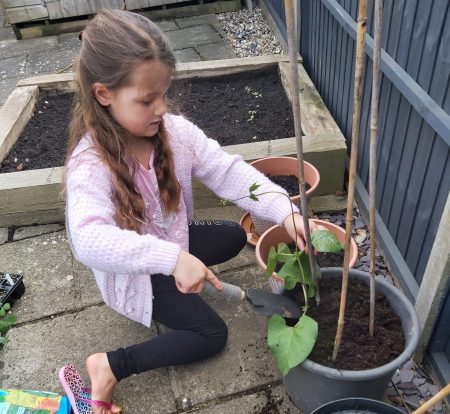
Disabilities : If your child has any learning needs or disabilities, or needs a calm environment, at home you’re able to cater to their needs and tailor things around how they learn best.
Nature : Home ed kids spend loads of time outside in nature.
Closeness : Home education is a privilege – we’re so fortunate to have lots of time to make memories with our children. And, as siblings, they’re super close too.
Mood : Both of our kids are happier out of school. There’s far less stress, anxiety, conflict and pressure in our household since we started home education.
Kindness : We find the home ed community to be so friendly – the kids play with others of all different backgrounds and ages, with disabilities too, and it’s never an issue.
Experiences : Children get to learn about the world by experiencing it, rather than from a book or a classroom.
Sleep : No more school runs! More time for relaxation, sleep and a slower pace.
Reductions : Lots of outings, clubs and lessons are offered at a reduced rate for home educators, so we’ve been able to do offer our children more experiences.
Personality : Home educated children don’t have to conform as much, they can be themselves.
What are the disadvantages of home education?
Time : It takes a lot of time to home educate your children. On top of the learning side, they’ll need more entertainment and mum’s taxi service to clubs, friends etc!

Winter : Socialising in big groups is harder in the winter – after a long, fun summer spent chilling in parks, it’s harder to entertain the kids in the winter.
Friendships : Social media groups help a lot, but at first it can be hard to find ‘your people’, and it can be hard to maintain old friendships made in school.
Patience : Some days you just run out!
Cost : There’s no funding for home education – any clubs, tutors, days out and exams you want to organise have to be funded by you.
Work : Fitting home education around work commitments can make life hectic. Often one parent won’t work, or will work part-time, and that has financial implications too.
Motivation : Motivating children to learn, socialise and exercise isn’t always easy – but rules and routines can help with this.
Teaching : I am fortunate to be a qualified teacher, but I do have home-educating friends who find the teaching side overwhelming at times.
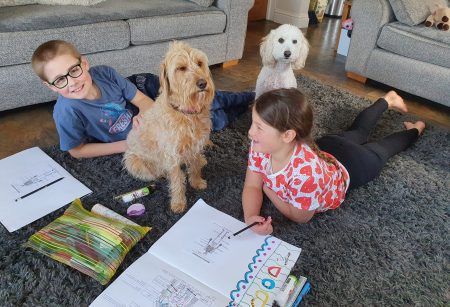
Freedom : Whilst there’s a lot more freedom for travel etc, as a home ed parent you will likely have little time away from your children.
Independence : You need to actively think about making sure your children still develop independence both in and out of the home.
Boredom : Home ed children have to occupy themselves more than those at school.
Isolation : If your child struggles with socialisation, it’s easier for them to isolate themselves through home education – so for some being in a setting may be better.
Needs : If your child has lots of complex needs, this may be managed more easily in a setting with professionals.
Siblings : If you have lots of children of different ages, it’ll take more time to teach them and meet everyone’s needs. But, on the flip side, I think being home ed could be quite lonely without siblings to play with.
Housework : With the kids at home all day there are more dishes, mounds of mess and muddy footprints. We get around this by making sure that the kids help out.
So, should you home educate?
Whilst there are loads of benefits to home-edding, it really is a huge commitment and a personal choice – as parents, you know your child and what they need best. The teaching side of things can be the biggest challenge for those not in the know – but this can be overcome with clubs, tutors and a good plan if it’s something that you want to do.
If you’re still deciding whether home education is the right path for you, or you need a little help on your home ed journey, try to talk to other home educating families through social media groups or friends. You could also visit the Shine Training Website – they offer resources to support home educating parents and young people aged 4-16.
For us, though things aren’t always perfect, home education has definitely changed our family for the better. We’ve made so many memories, and the extra time with the kids is something that I will always be grateful for. Follow what we get up to instagram!
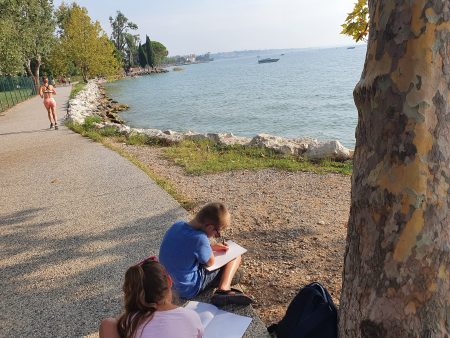











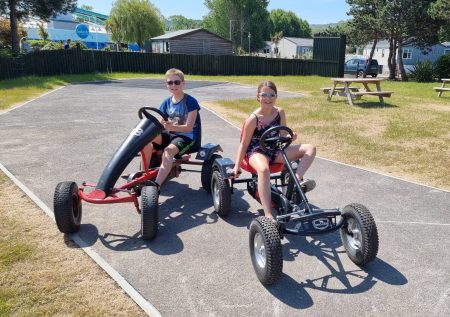

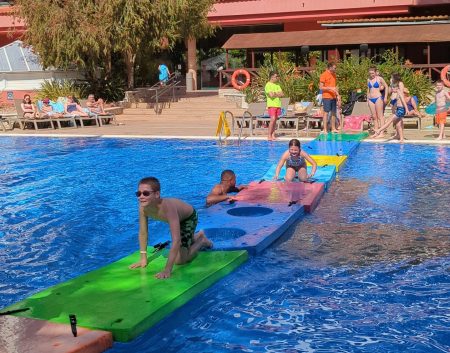
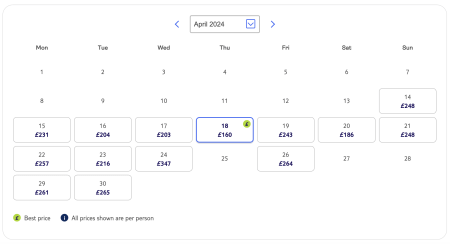
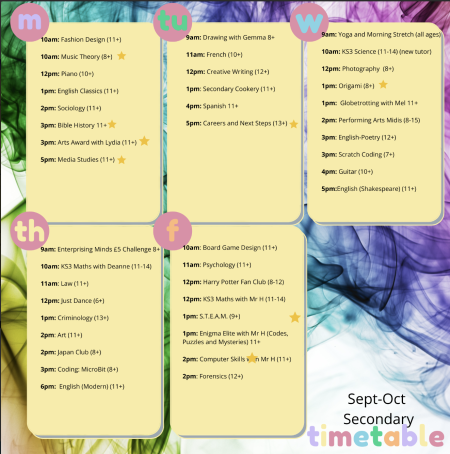
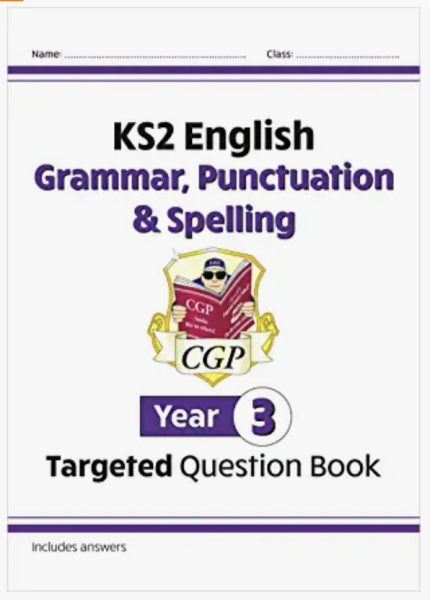
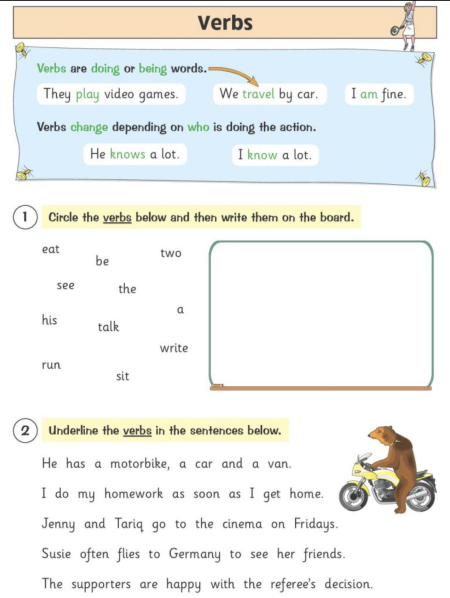
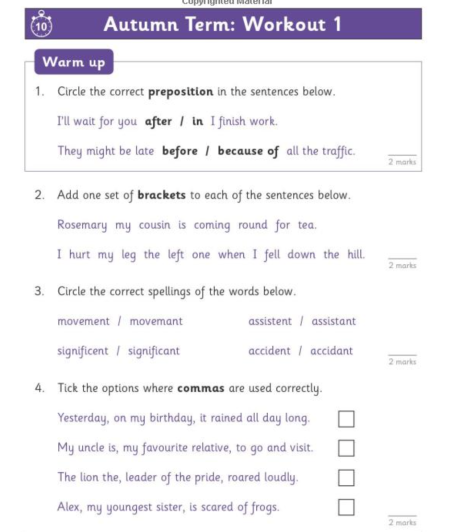
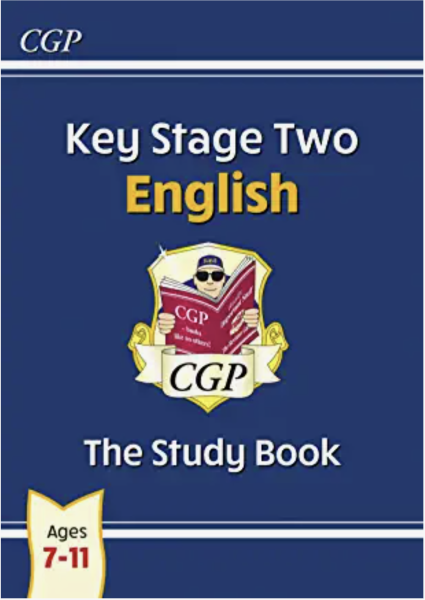
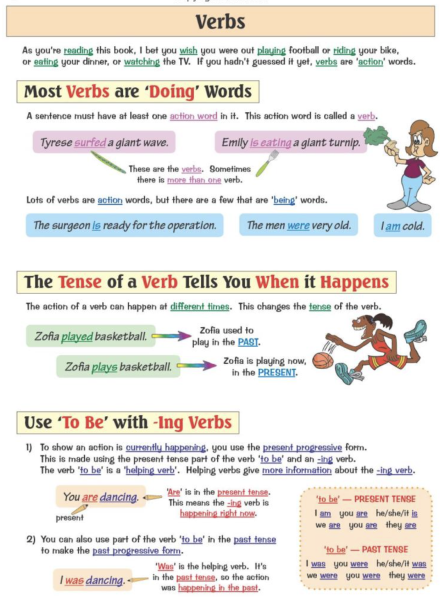
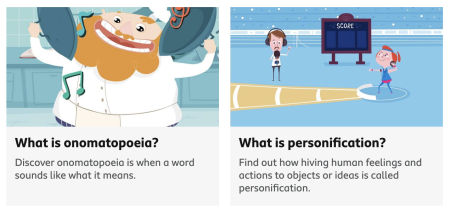

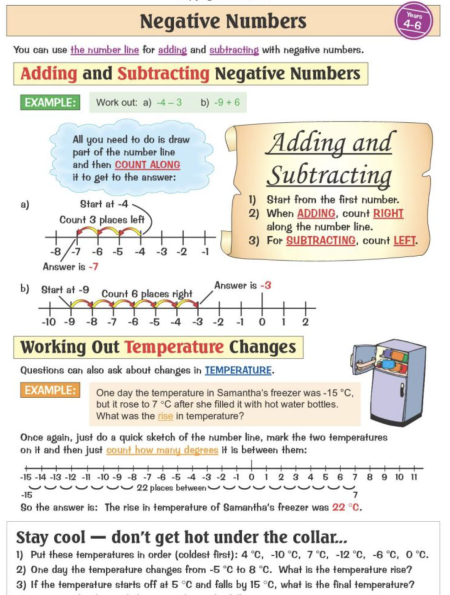

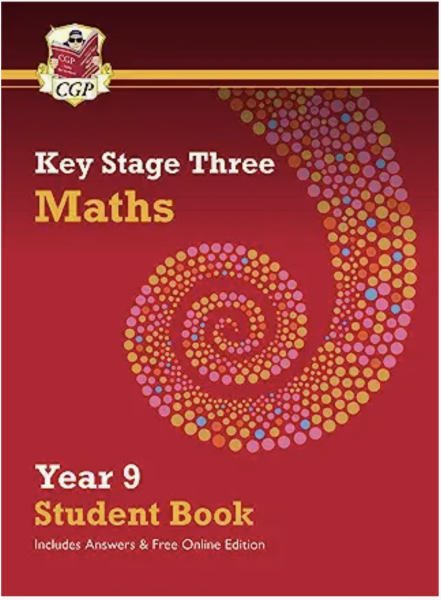

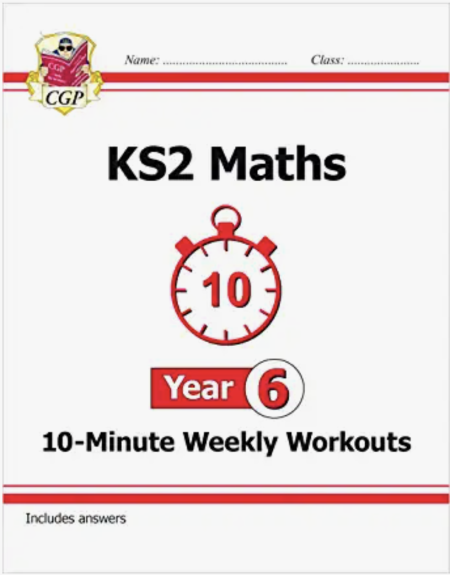





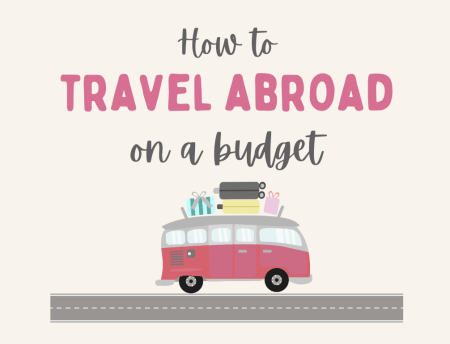


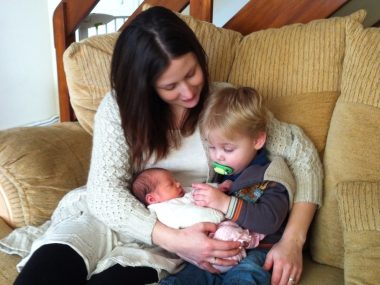




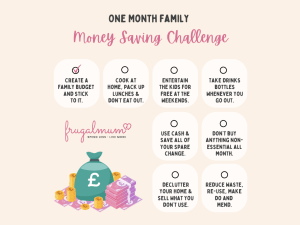

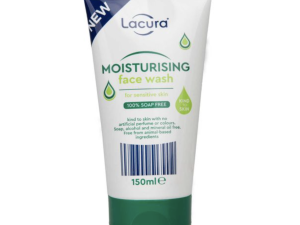
2 comments
Wow, Natalie! What a comprehensive run down. It’s really interesting to hear how you are finding things and the links are invaluable. My niece has just started being home-schooled and I’ll definitely be forwarding the link.
Thanks for your lovely message Nathan – I hope your niece has a great homeschooling journey and glad to help!
Nat x